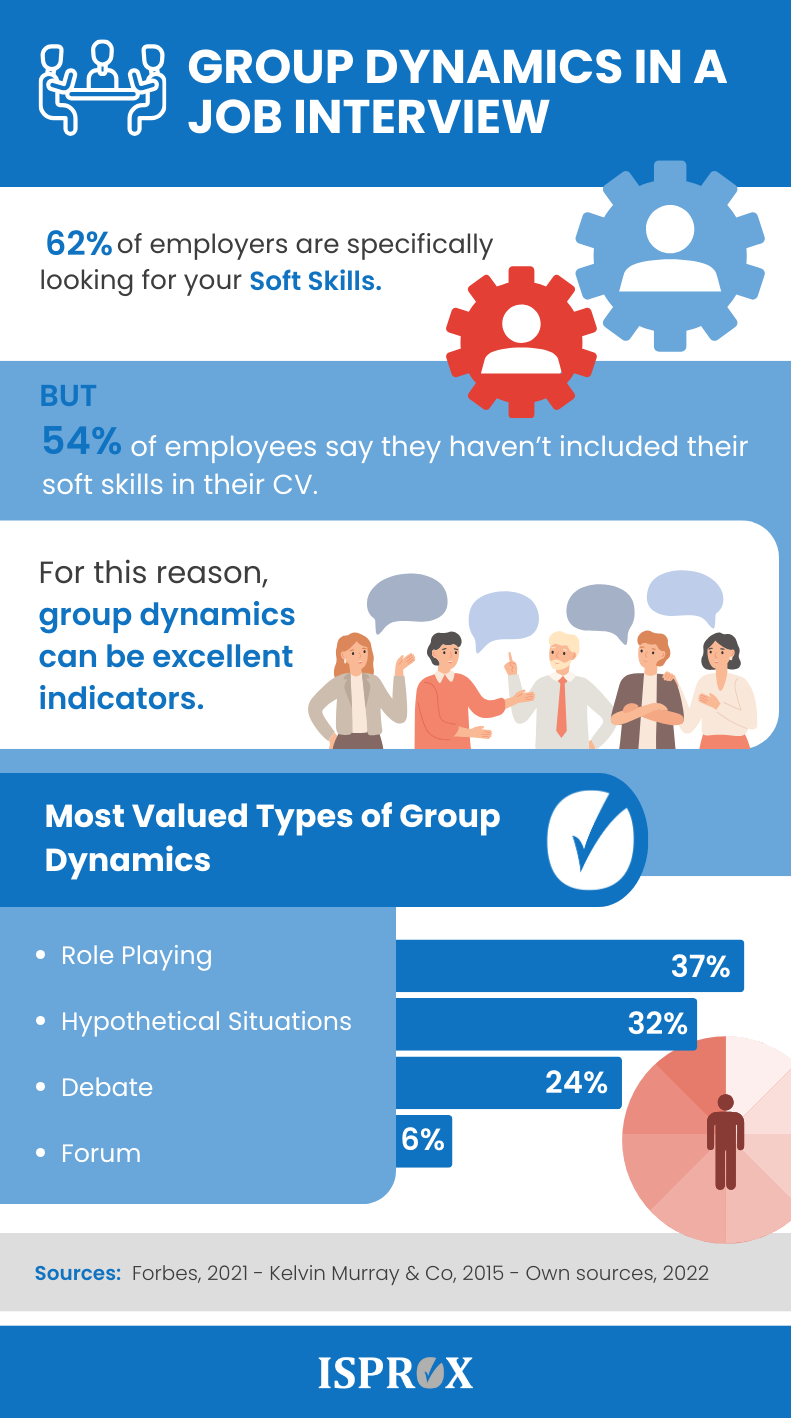Are you actively looking for work? Believe it or not, the group dynamics of an interview are increasingly determining the hiring process. Are you prepared to excel in a group interview? If you don't defend and promote your candidacy in these collective activities, others will be chosen. Find out what you should and shouldn't do to achieve your goal!
Are you looking for a new job challenge?
Register your CV, and from ISPROX, we will contact you if any vacancy matches your profile.

Content
Finding a job is a job in itself. If you have experience of planning and strategising, you will know that researching and preparing for each challenge is crucial to overcoming it. You need to become the perfect candidate for the job you want.
Recruitment has evolved a lot. Group interviews, for example, are becoming more common. There are also new variations that companies are incorporating into their recruitment processes. What do these US data tell you?:
If your company has brilliant and productive professionals, it’s in your best interest to prevent their departure by implementing measures to minimize this risk.
These data undoubtedly show how the sector is evolving. The processes are becoming more professional, longer and they are trying to get to know the participants better. It is therefore in your best interest to focus on knowing the situation and presenting your qualities in a credible way.
One of the tests that is being used more and more in these recruitment processes is the group interview. Don't panic, use it as another opportunity to show off your qualities.
Do you know what it is? It is a collective activity designed to see its participants in action. It is based on specific objectives and situations adapted to the circumstances of each process. Its main function is to analyse and compare the characteristics of the different candidates during this exercise.
In fact, it allows for observation:
To prepare for a group dynamic such as an interview, there are two essential prerequisites:
These group dynamics are very useful when looking for specific professional profiles. As you prepare to participate, don't forget what your role is. Employers want to know how you work and how you can be valuable to the organization.
As you are no doubt aware, soft skills are becoming increasingly important and valued when recruiting talent. These group dynamics clearly reflect the most salient qualities of each candidate, in action and in a natural way.
Therefore, you should be very aware of their characteristics from the beginning, before you act in them:
While it is true that each is unique, as it is designed for specific purposes and contexts, this classification is useful:
Remember: recruiters observe, compare and evaluate. They have a clear idea of what they need, the ideal profile they want, but you don't. If you think they are looking for a charming and charismatic leader, but in fact they need a conciliatory and creative collaborator, you will not fit their taste.
In such situations it is natural to act as we are. In general, very different personal styles are evident:
What does the team you aspire to join need? No one knows, which is why this group method is so useful. The recruiters try to find the profile that comes closest to their job requirements. The final decision will take into account aspects such as:
Now that you know what group dynamics are in an interview, do you know how to behave? If you want to get through it and be chosen, these practical tips will help.
These general recommendations should help you to be successful in a group recruitment exercise. Of course, you must remain true to your own personal style, which may encourage you to reconsider some of these tips.
In any case, they are an effective reference guide for your success goals:
Your behaviour should not be guided by your logical self-interest. You are fundamentally mistaken if you try to defeat or corner the other candidates. In this collective encounter, they are not your rivals for the same job. They are your fellow adventurers, you are all collaborators in the shared challenge that is the group dynamic of the interview.
Build bridges: If you get everyone to do their best, you will be invaluable to any organisation. If you focus on distracting and hindering others, who will want you on their team?
The key thing is that you bring value to the organisation. This is what recruiters are trying to assess in each candidate. In this sense, your qualifications, skills and behaviour will be the elements used to judge you.
Remember that you only have seven seconds to make a positive first impression, so make the most of your presence! However, it is not so much the language of the body that is important as the inner state of mind that governs you. In reality, physicality is a reflection of your inner world. If you are enthusiastic, committed, empowered and motivated, your gestures and expressions will reflect this. If you are not, you will provoke mistrust and rejection.
So make sure you arrive in the best possible condition: rested, calm, well-fed and looking your best. Whether you like it or not, your wardrobe and appearance also reflect how you look and feel and influence others. So choose an appropriate look, but be comfortable and be yourself when you wear it.
Finally, respect your colleagues. Listen to others and build bridges - don't forget that they are your allies, the team members you can count on!
Whether you are taking part in an online or face-to-face group interview, there are some behaviours that are totally inadvisable. They will make you stand out in a negative way, which is a prelude to failure. Avoid these actions:
Group dynamics are activities designed to get to know the participants in order to determine their suitability for the vacancy. Each one is different and has its own reasons. Moreover, the objectives and characteristics sought are unknown to the participants.
Therefore, naturalness and being yourself are the two most important aspects for success. Don't try to be different: your individuality is your strength. Recruiters are looking for a certain type of talent. Show them yours and they will surely choose you if you fit in.
Of course, participate, be assertive, treat others with respect and companionship, and try to add value with your presence. In short, in the group dynamic of an interview you should behave as if you were already working with your new colleagues in the company. That is your responsibility. The rest is in the hands of the recruiter.






Essential for basic site functionality and security. Always active.
Guardan tus ajustes como idioma o región.
Help us understand how you use the site (e.g., Google Analytics).
Allow personalized advertising and measure effectiveness (e.g., Meta/Ads).